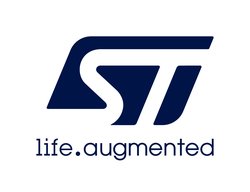NUCLEO-L4R5ZI
STM32 Nucleo-144 development board with STM32L4R5ZI MCU, supports Arduino, ST Zio and morpho connectivity
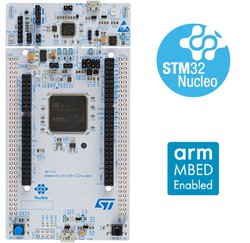
Overview¶
The STM32 Nucleo-144 board provides an affordable and flexible way for users to try out new concepts and build prototypes with the STM32 microcontroller, choosing from the various combinations of performance, power consumption and features. The ST Zio connector, which is an extension of Arduino™ Uno V3, provides access to more peripherals and ST morpho headers make it easy to expand the functionality of the Nucleo open development platform with a wide choice of specialized shields. The STM32 Nucleo-144 board does not require any separate probe, as it integrates the ST-LINK/V2-1 debugger/programmer and it comes with the STM32 comprehensive software HAL library, together with various packaged software examples, , as well as a direct access to the ARM®mbed™online resources.
Microcontroller features¶
- STM32L4R5ZIT6 in LQFP144 package
- ARM®32-bit Cortex®-M4 CPU with FPU
- 120 MHz max CPU frequency
- VDD from 1.71 V to 3.6 V
- 2MB Flash
- 640KB SRAM
- RTC with HW calendar, alarms and calibration
- Up to 24 capacitive sensing channels: support touchkey, linear and rotary touch sensors
- Advanced graphics features
- Chrom-ART Accelerator™ (DMA2D) for enhanced graphic content creation
- Chrom-GRC™ (GFXMMU) allowing up to 20% of graphic resources optimization
- MIPI® DSI Host controller with two DSI lanes running at up to 500 Mbits/s each
- LCD-TFT controller
- 16x timers: 2 x 16-bit advanced motor-control, 2 x 32-bit and 5 x 16-bit general purpose, * 2x 16-bit basic, 2x low-power 16-bit timers (available in Stop mode), 2x watchdogs, SysTick timer
- Up to 136 fast I/Os, most 5 V-tolerant, up to 14 I/Os with independent supply down to 1.08 V
- External memory interface for static memories supporting SRAM, PSRAM, NOR, NAND and FRAM memories
- 2 x OctoSPI memory interface
- 4x digital filters for sigma delta modulator
- 12-bit ADC 5 Msps, up to 16-bit with hardware oversampling, 200 μA/Msps
- 2x 12-bit DAC, low-power sample and hold
- 2x operational amplifiers with built-in PGA
- 2x ultra-low-power comparators
- 20x communication interfaces
- USB OTG 2.0 full-speed, LPM and BCD
- 2x SAIs (serial audio interface)
- 4x I2C FM+(1 Mbit/s), SMBus/PMBus
- 6x USARTs (ISO 7816, LIN, IrDA, modem)
- 3x SPIs (5x SPIs with the dual OctoSPI)
- CAN (2.0B Active) and SDMMC
- 14-channel DMA controller
- True random number generator
- CRC calculation unit, 96-bit unique ID
- 8- to 14-bit camera interface up to 32 MHz (black and white) or 10 MHz (color)
Board features¶
- Two types of extension resources
- Arduino Uno Revision 3 connectivity
- STMicroelectronics Morpho extension pin headers for full access to all STM32 I/Os
- On-board ST-LINK/V2-1 debugger/programmer with SWD connector
- Selection-mode switch to use the kit as a standalone ST-LINK/V2-1
- Flexible power-supply options
- ST-LINK USB VBUS or external sources
- Three User LEDs
- Two push buttons: USER and RESET
- USB re-enumeration capability: three different interfaces supported on USB
- Virtual Com port
- Mass storage (USB Disk drive) for drag'n'drop programming
- Debug port
Board pinout¶
Pins Legend¶
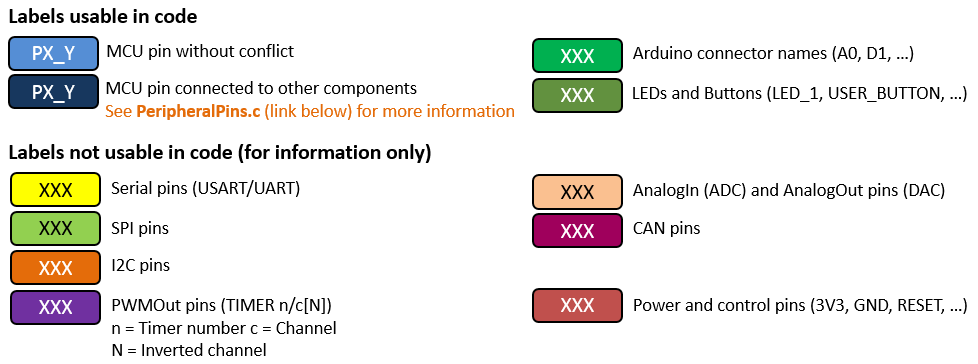
You can find more details on the available pins and labels in the PeripheralPins.c and PinNames.h files.
These files can be found in:
- ARMmbed/mbed-os repository on GitHub (up-to-date version, used with mbed CLI commands)
- mbed-dev library in developer.mbed.org (source files of the mbed library used on mbed compiler IDE)
Zio and Arduino-compatible headers¶
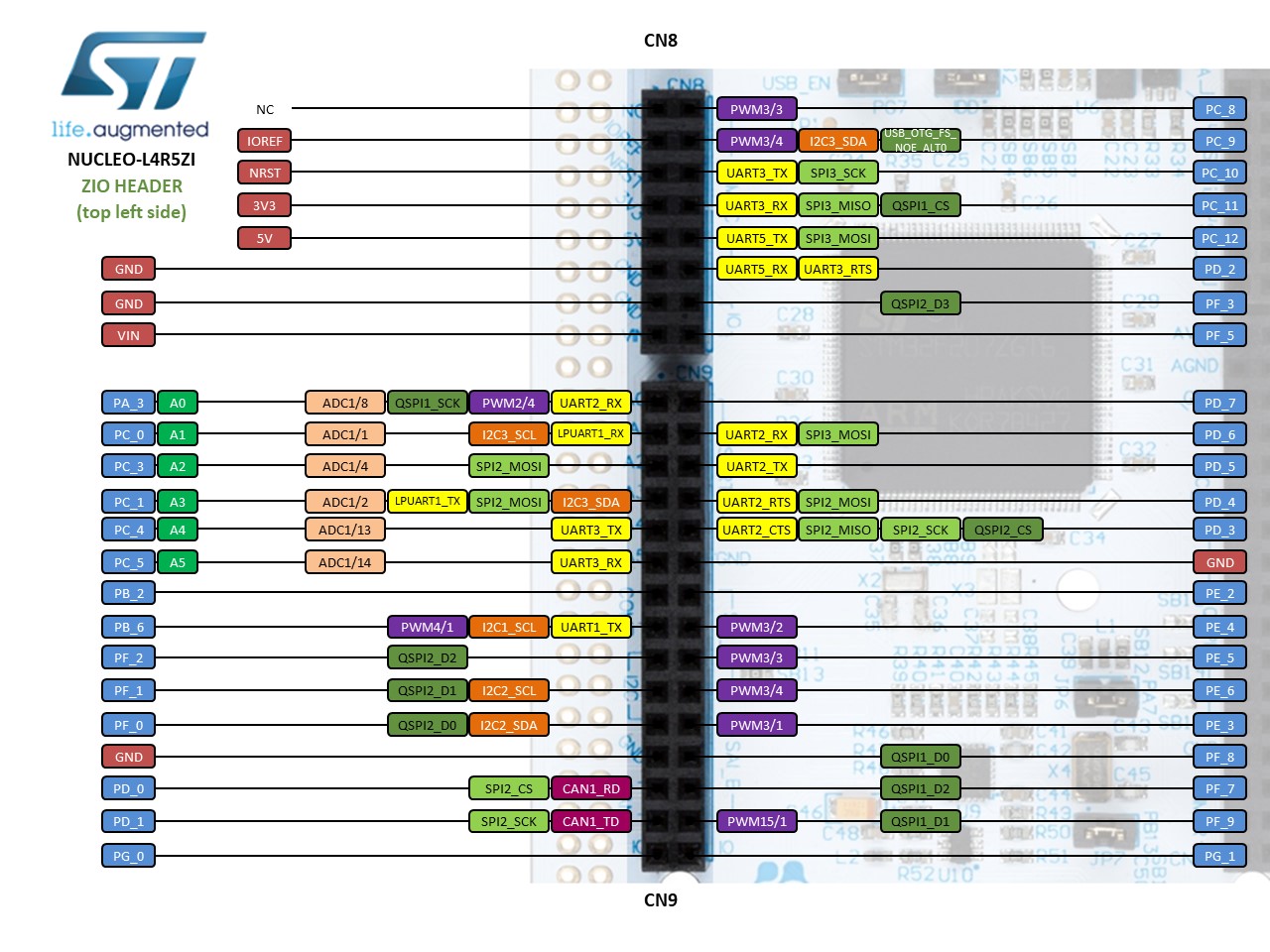
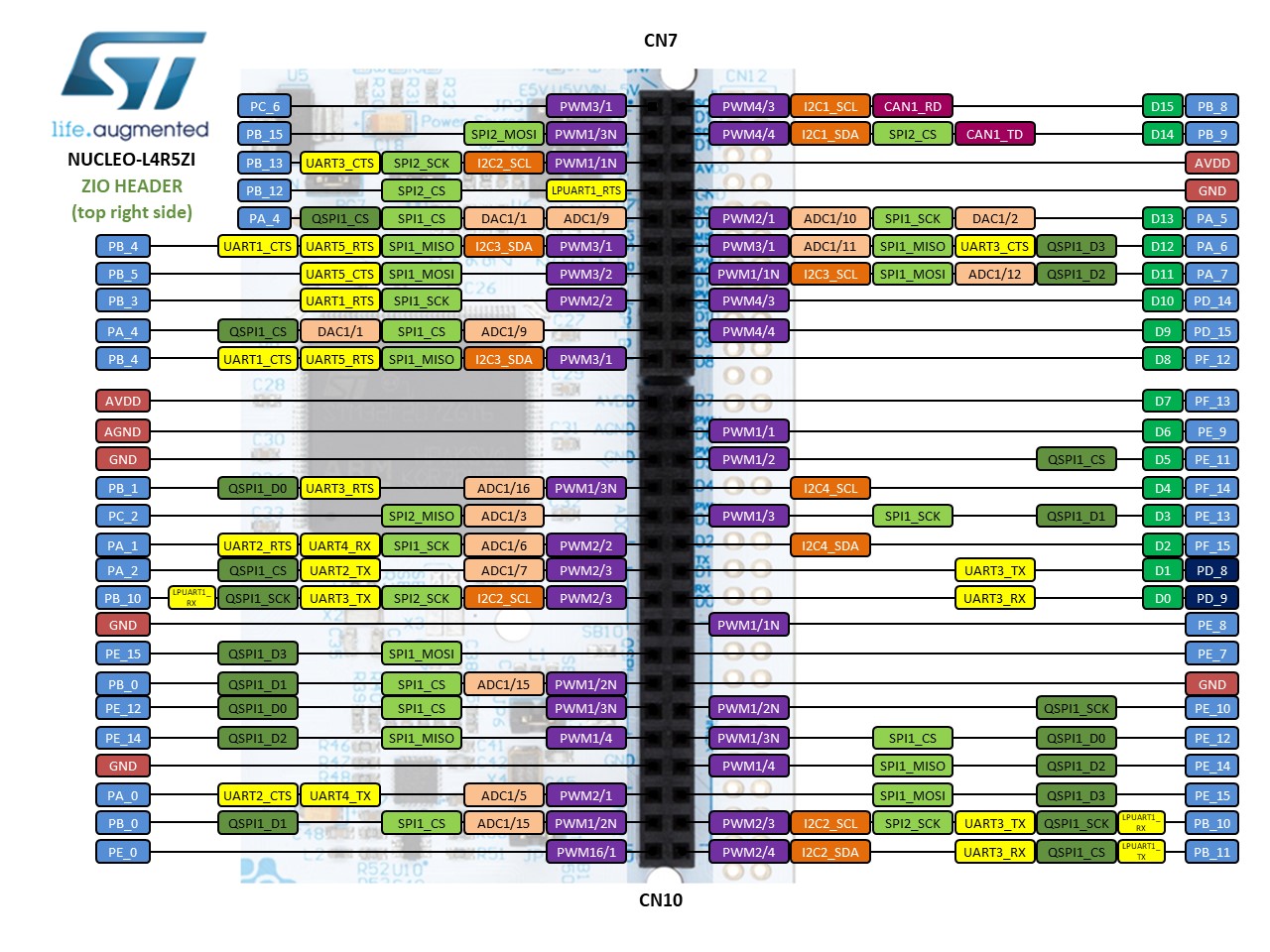
CN11 CN12 headers¶
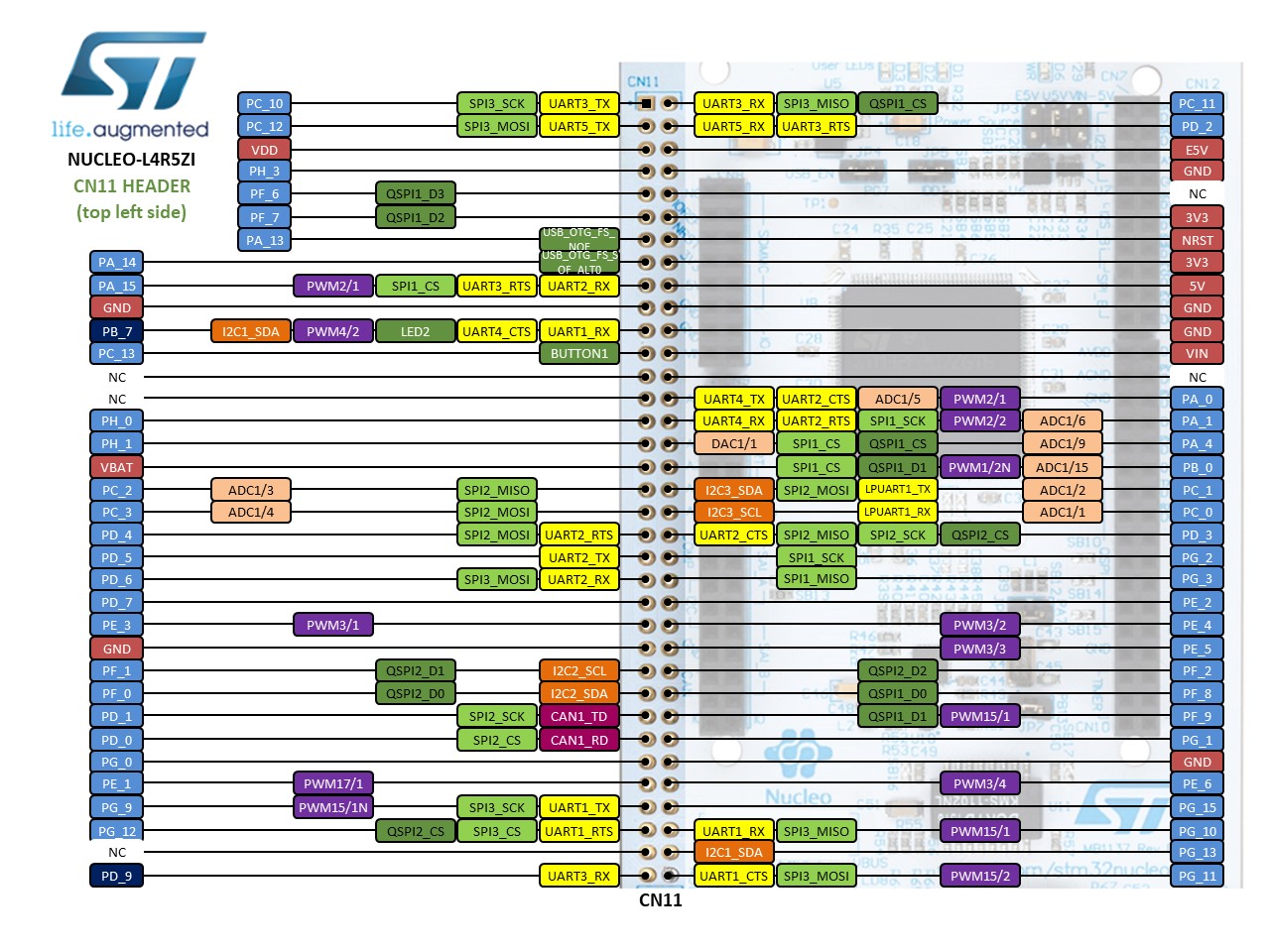
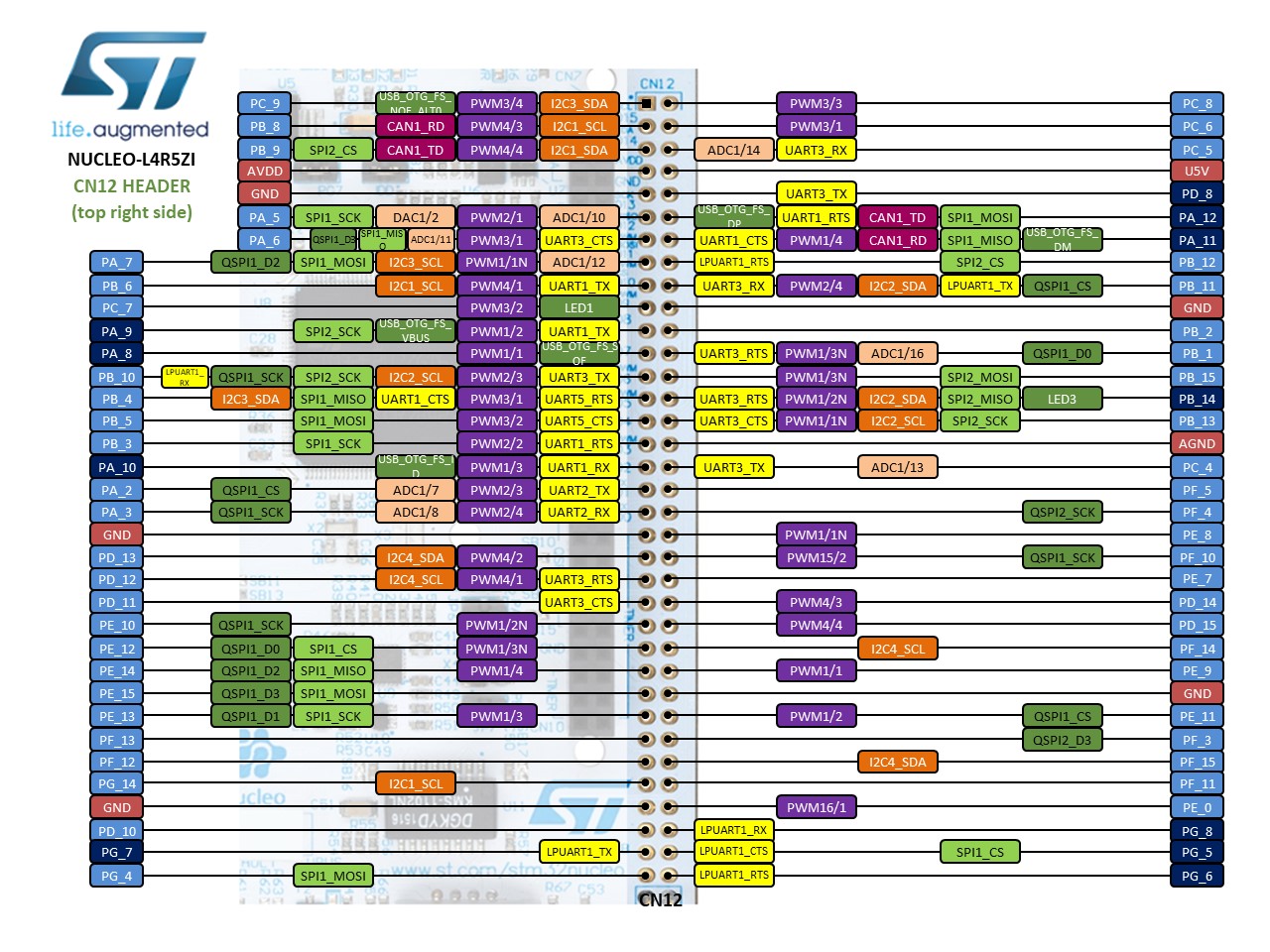
Technical references¶
For more information, please refer to:
Known limitations¶
The following section describes known limitations of the platform. Note that general issues are tracked into the mbed repository available on GitHub.
This platform does not present any limitation.
Tips and Tricks¶
Find more information in ST WIKI pages.
You need to log in to post a discussion
